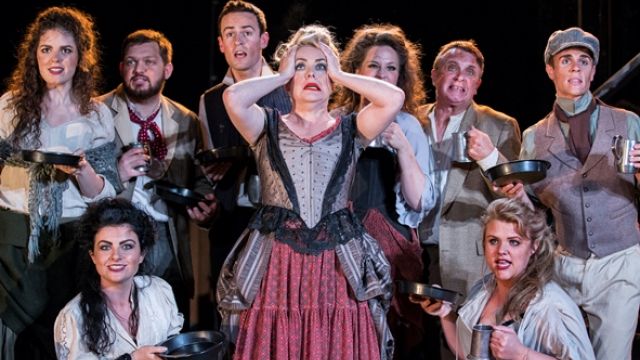Sweeney Todd The Demon Barber of Fleet Street.
Adapted from a blood and thunder melodrama, Sweeney Todd tells the tale of a barber, a former convict who returns to London from Australia bent on revenge for his unjust transportation, and proceeds slit the throats his customers, who are subsequently baked into pies by his accomplice Mrs Lovett.
Written as a large musical on an operatic scale, with sumptuous score and orchestrations, and played on both major commercial stages and in opera houses around the world, it becomes a very different piece when pared back and presented acoustically (no body microphones), with a small band at the back of the stage, in an intimate venue.

Far larger cut-down commercial versions than the current New Theatre production, which earned nicknames like ‘Teeny Todd’ (popularized through Forbidden Broadway), and even ‘Teeny Tiny Todd’, met with encouragement and collaboration from composer / lyricist Stephen Sondheim.
Clearly it’s a piece ripe for reinterpretations, including this fluent, purposeful retelling by director Giles Gartrell-Mills.
Yet, there are implications for Sweeney when the musical becomes a chamber piece. Just how much of the musical variety and richness will be lost? Will the rebalance toward the natural voices and melodramatic acting carry the day?
Rich harmonic complexities and nuances embedded in the orchestrations disappear when the scoring is reduced to three hard-working musos. The balance shifts to the vocals, which the small band generally supports nicely, and there are wonderful voices on display.
Ensemble passages are major highlights, really packing a punch. Jaimie Lee Johnson, a gorgeous, delicate Johanna, and Josh Anderson’s archetypal dashing hero Anthony handle the young romantic side of things delightfully. They do full justice to their portion of the score, with just the right natural projection for the venue. Byron Watson’s Judge Turpin brings authority to the lecherous villainy of the role, particularly powerful in the intense flagellation scene. Simon Ward’s foppish Beadle Bamford deliciously combines comedy and menace. As the beggar woman, Courtney Glass brings her Broadway experience to bear in a highly accomplished performance.
 Top of the pile, though, is Lucy Miller’s darkly comic Mrs Lovett, mining every ounce of the role’s complexity, and the wit of Sondheim’s lyrics.
Top of the pile, though, is Lucy Miller’s darkly comic Mrs Lovett, mining every ounce of the role’s complexity, and the wit of Sondheim’s lyrics.
Justin Cotta creates a dark, brooding Sweeney, yet lacks the authoritative unamplified vocal chops to really nail the moments where his vocals are so pivotal to the dramatic intensity.
Vivacious and appealing as Aimee Timmins is, the choice of casting a young woman as the waif-urchin Tobias never quite works for me, though her early spruiking scene is very effective. The cod-Italian of Michael Jones’ snake-oil salesman Pirelli could well afford to go further over the top.
The excellent ensemble, a near-constant presence, purposeful as a ‘Greek’ chorus commentary, feel sometimes superfluous when they do more conventional chorus stuff, like the pie-catching in ‘A Little Priest’, and distract in the sometimes excessive movement of the show’s three rostra. But they’re constantly committed to the vision.
Atmospherically lit by Liam O’Keefe, in the end the drama (melodrama) probably edges out the musical experience in this production, especially if you’ve enjoyed a more musically lavish production. At the same time, though, on a shoestring budget at New, this compact Sweeney represents a huge achievement.
Neil Litchfield
Photographer: Bob Seary
Subscribe to our E-Newsletter, buy our latest print edition or find a Performing Arts book at Book Nook.

